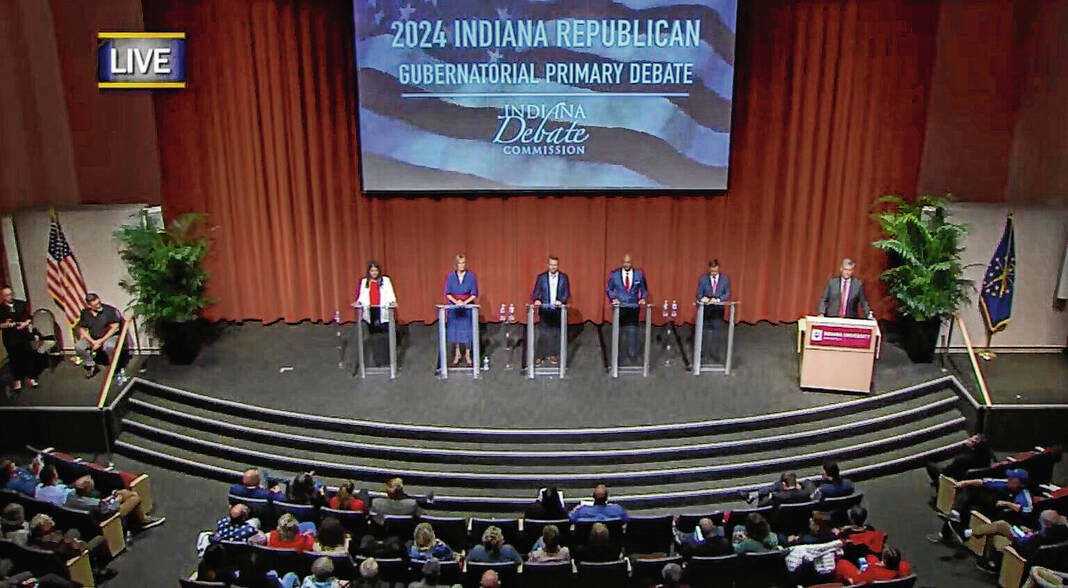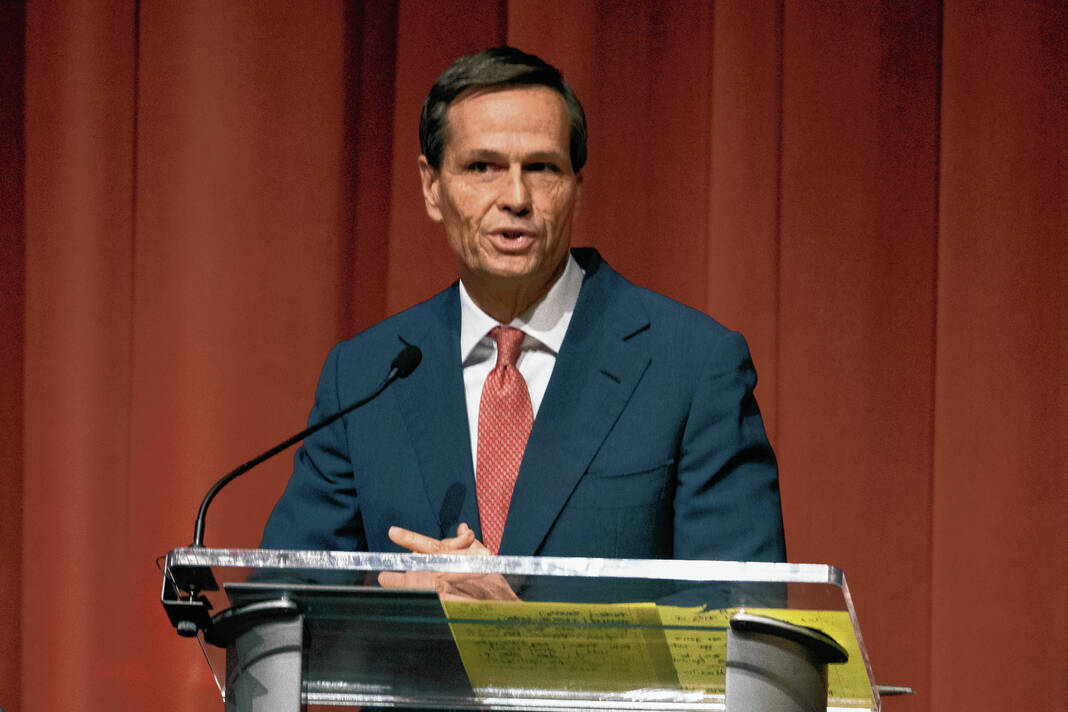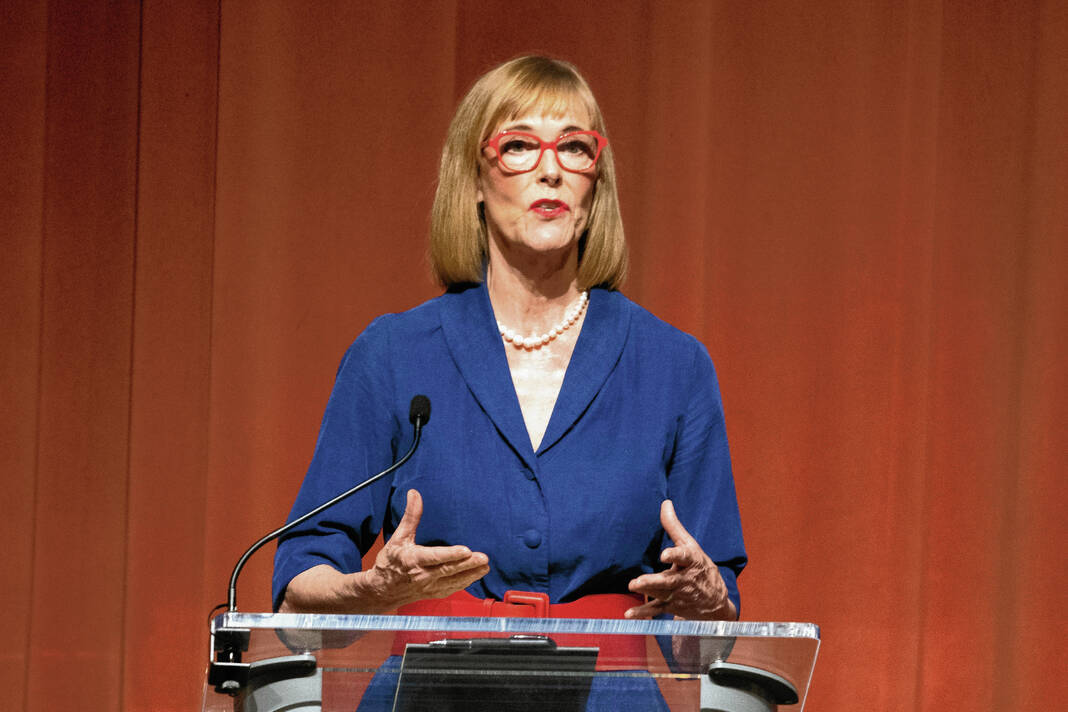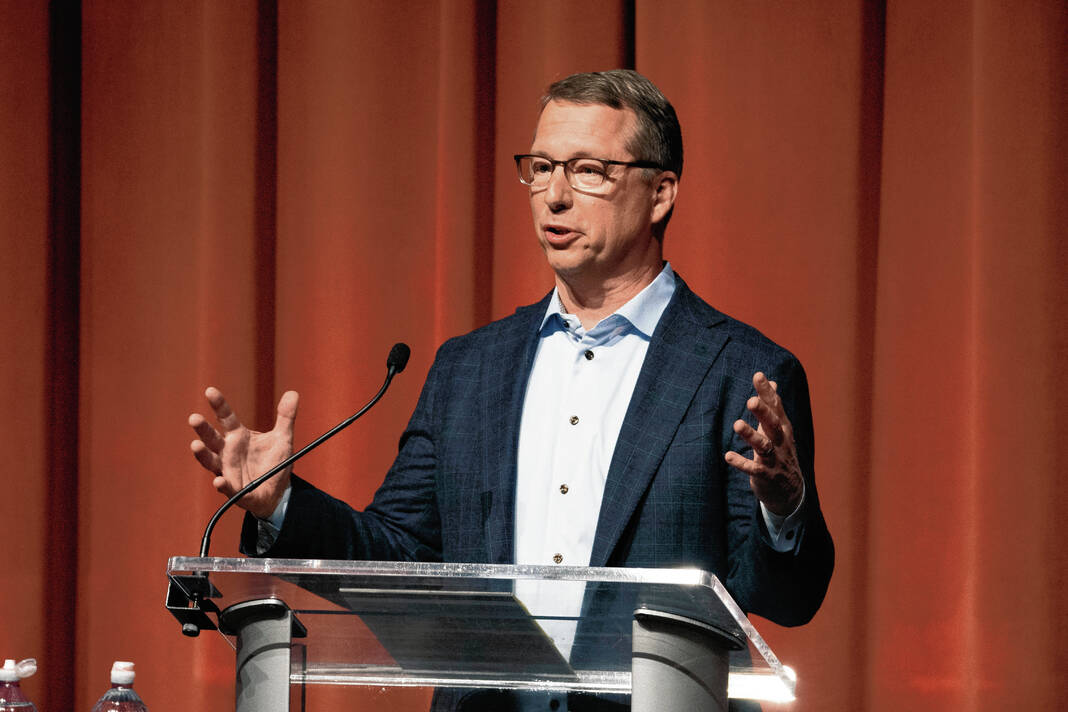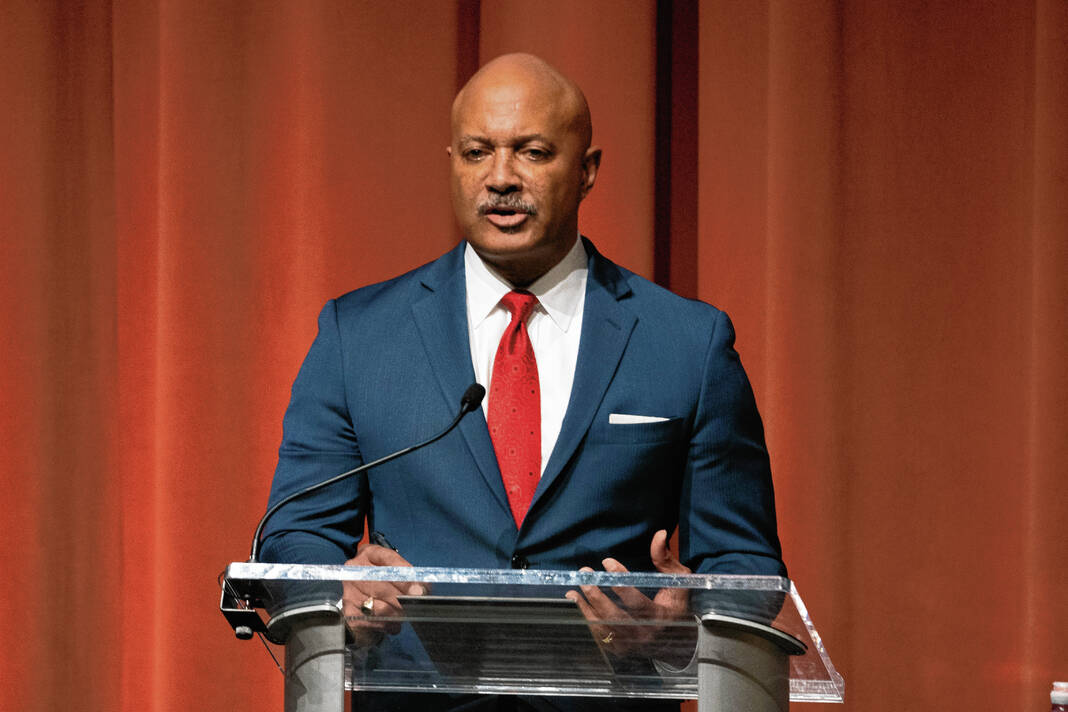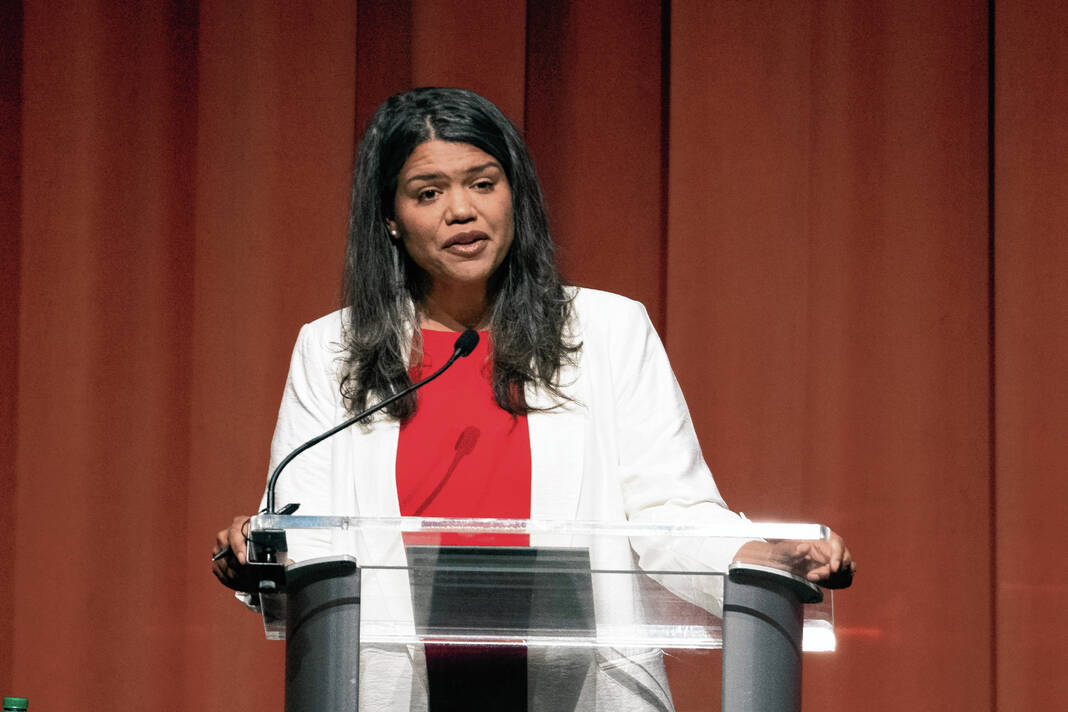Five of the six Republicans hoping to be Indiana’s next governor squabbled more with the moderator than they did over policy issues during their last pre-primary debate on Tuesday — just two weeks before the May election.
And although U.S. Sen. Mike Braun, largely considered to be the frontrunner in the race, was absent from the debate, he was sparsely mentioned by his competitors.
The candidates met at IUPUI’s Hine Hall Auditorium at the 90-minute debate hosted by the nonpartisan Indiana Debate Commission.
On the stage were former Secretary of Commerce Brad Chambers, Lt. Gov. Suzanne Crouch; former Indiana Economic Development Corp. (IEDC) leader Eric Doden, former Attorney General Curtis Hill and conservative activist Jamie Reitenour.
Braun pulled out of the debate unexpectedly Monday evening, however, saying he needed to be in Washington, D.C. to vote.
Although Braun submitted a statement to the commission before the debate, it was not read before the audience Tuesday evening. Cindi Andrews, the Indiana Debate Commission president, said that’s because his statement didn’t follow guidelines.
“I told him that he could submit a statement of two to three sentences about why he was unable to send. What he sent … was about politics,” Andrews said. “So, we opted not to use that, but to simply rephrase.”
Braun said in the debated statement that, “I was looking forward to sharing my vision with Hoosiers at tonight’s debate, but Chuck Schumer has called the Senate into session.”
“Tonight, I am in D.C. voting ‘no’ on a bill to send $95 billion of your money overseas instead of securing our open southern border, which puts Hoosier families in danger every day,” he continued, referring to a foreign aid package passed by the U.S. Senate late Tuesday. “I’m proud to stand up for you and vote against the Biden spending spree making life unaffordable for so many Hoosiers.”
Even so, Braun’s competitors did little to point out his absence outside of a few small jabs at his record. Specific references were made to the senator’s support for increased state gas taxes, “lack” of action on illegal immigration and his rejection of the CHIPS and Science Act, which was authored by Indiana’s senior U.S. Sen. Todd Young.
Reiterating their stances
The participating candidates answered questions posed primarily by the public; the commission invited Hoosiers to submit queries online and received more than 200 questions. Jon Schwantes, host of PBS’s “Indiana Lawmakers,” moderated the debate.
Among those questions was one about the Indiana Economic Development Corp. (IEDC) and how each of the candidates might transform the quasi-government agency that was formerly led by Doden.
Later, under Chambers’ helm, the IEDC launched the ambitious LEAP project in Boone County and bought thousands of acres of farmland while navigating water shortages.
Doden said the IEDC shouldn’t be “buying up land and moving water around the state,” emphasizing that wouldn’t happen under his administration. Crouch said she seeks to empower local economic development officials and limit income tax to grow the state’s economy.
Reitenour said the IEDC overpaid for land in Boone County, while Hill referred to the agency as a “shadow government” that lacks transparency.
In his defense, Chamber said tens of thousands of high-wage jobs are coming from the project. He said, too, that Indiana has “plenty of water” if we use it strategically.
Separately, on property taxes, Reitenour said referendum rates are growing too fast and homeowners can’t keep up. She said Indiana needs a statewide conversation at the county level to identify the best solutions.
Chambers also said property taxes need to be addressed and promised to focus on making the assessment process more uniform. Hill agreed that assessments are an issue and called for a comprehensive, long-term plan to make a fix.
Doden additionally made reference to his campaign plan, which limits growth of property taxes to about 5% a year.
Crouch — whose plan to “axe” the state’s personal income tax has repeatedly come under attack but her competitors — said she is open to property tax cuts, as well.
The night’s single question directed at education asked candidates how they would improve dismal K-12 test scores.
Doden said he supports parental choice and is a “big fan” of private school vouchers and “competition.” He also pointed to his plan to invest in teachers by reducing their income and property taxes.
Crouch wants a lifetime education system focused on reading, writing, “‘rithmetic” and reasoning. Retienour, meanwhile, said Indiana is in the midst of an educational “crisis.” A comeback will require more trades training for younger Hoosiers and removing social emotional learning (SEL) from classrooms, she said.
Chambers called Indiana’s current educational attainment rates “unacceptable” and said more Hoosiers need skills training. It also requires more parental involvement and investing in work-based learning, rather than buildings and administration
Hill further positioned that federal dollars have no place in Indiana education. “The federal government acts like a crack dealer — dangling money out in front of you,” he said. He would instead urge local districts to turn down the money and direct their own programming.
Candidates unhappy with debate format
Multiple questions posed by Schwantes, the moderator, drew pushback from the Republican hopefuls, though.
That included a series in which candidates were asked to raise their hands — signaling yes or no — about whether they would have voted for the CHIPS Act; if they are confident in the integrity of Indiana elections; and if they agree that the 2020 election was “stolen” from former President Donald Trump.
Schwantes additionally asked if they would accept the results of the 2024 Election. Reitenour specifically spoke out, saying there’s “no way to know what will happen before now and then.”
At one point, Schwantes even gave Braun’s reasoning for supporting a gas tax increase when he was a state representative.
Speaking to reporters after the debate’s conclusion, candidates largely took issue with which questions were selected — and how they were asked. They also complained that many of the debate topics were centered around national issues, not state ones.
“I think we spent too much time fighting with the moderator,” Hill said. “It’s the damnedest thing I’ve seen. I wish we’d had questions that were more engaging for the public.”
Crouch said following the debate that she mostly refrained from attacking Braun because she preferred to “speak to the issues that I thought, that I believe, that the voters are interested in — at least the voters I’ve talked to.”
Doden said he wanted to focus on his campaign’s plan: “If Mike Braun thought it was important, he should have been here.”
Hill called Braun’s absence “intentional” and said the debate — not the capitol — “was the place to be.” Reitenour said those present Tuesday are “on the ground,” and that voters “aren’t interested in hiring a senator that is not concerned about Hoosier issues.”
Chambers added that “leadership is about showing up … and he didn’t show up.”
“He could have gotten a plane. He could have gotten one of his big donors from out-of-state to fly him here to get him to this debate, but he chose not to,” Chambers said, speaking about Braun. “I think that’s a disservice to Hoosiers.”
The voting on the foreign aid package was still ongoing in Washington D.C. when the debate ended in Indianapolis.
Braun is the only gubernatorial candidate to have received an endorsement from Trump, but all five candidates said Tuesday they would have also welcomed Trump’s support.
Reitenour said the question was meant only to create division.
The candidates have met at three other debates and a business forum — although not everyone was invited to all the events.
By Casey Smith – The Indiana Capital Chronicle is an independent, not-for-profit news organization that covers state government, policy and elections.


